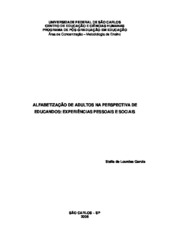| dc.contributor.author | Garcia, Stella de Lourdes | |
| dc.date.accessioned | 2016-06-02T19:40:01Z | |
| dc.date.available | 2007-10-19 | |
| dc.date.available | 2016-06-02T19:40:01Z | |
| dc.date.issued | 2006-04-15 | |
| dc.identifier.citation | GARCIA, Stella de Lourdes. Adults alphabetization in the learners perspective: personal and social experiences.. 2006. 176 f. Dissertação (Mestrado em Ciências Humanas) - Universidade Federal de São Carlos, São Carlos, 2006. | por |
| dc.identifier.uri | https://repositorio.ufscar.br/handle/ufscar/2800 | |
| dc.description.abstract | The objective of this work was to identify and to analyze which personal and social experiences are relating to the beginning of reading and writing learning, in the perspective of adult learners. This is a qualitative inquiry, whose search involved the accomplishment of interviews half-structuralized with six learners, that they had been part in 2003 of the Program of Alphabetization, Brasil Alfabetizado , implanted in the city of São Carlos - SP, Brazil, in which we act as educator. In our theoretical referential we present the characterization of the informational society, some inequalities configured in its interior and we argue the direction of the critical alphabetization in Paulo Freires s and others authors perspective, as Henry Giroux and Ramón Flecha. We analysed the content of the interviews, the personal and social experiences in the interior of the illiteracy had been classified as no dialogic experiences, therefore they disabled the social interchange and limited learners in the personal sphere. The reading and writing learning allowed positive experiences in the personal and social sphere, making possible the recovery of self-confidence of adult learners and the transformation of some of the situations of oppression lived deeply by learners, because to learn reading and writing means the appropriation of an instrument that allows the intervention in the reality. However, we emphasize the necessity of an alphabetization practice that consider both reading of the world and reading of the word , that they privilege the dialectic between the instrumental and communicative dimension, as important stage of the social transformation, that it is only become fullfilled in communion, in dialogue. The learners also interviewed had offered reflections for educators, as well as for the elaboration of public politics in the Alphabetization and Education of Adults areas. | eng |
| dc.description.sponsorship | Financiadora de Estudos e Projetos | |
| dc.format | application/pdf | por |
| dc.language | por | por |
| dc.publisher | Universidade Federal de São Carlos | por |
| dc.rights | Acesso Aberto | por |
| dc.subject | Educação de adultos | por |
| dc.subject | Alfabetização de adultos | por |
| dc.subject | Freire, Paulo, 1921-1997 | por |
| dc.subject | Pedagogia crítica | por |
| dc.title | Alfabetização de adultos na perspectiva de educandos: experiências pessoais e sociais | por |
| dc.title.alternative | Adults alphabetization in the learners perspective: personal and social experiences. | eng |
| dc.type | Dissertação | por |
| dc.contributor.advisor1 | Reyes, Cláudia Raimundo | |
| dc.contributor.advisor1Lattes | http://genos.cnpq.br:12010/dwlattes/owa/prc_imp_cv_int?f_cod=K4793476E9 | por |
| dc.description.resumo | O objetivo deste trabalho foi identificar e analisar quais experiências pessoais e sociais se relacionam com o início da aprendizagem da leitura e da escrita, na perspectiva de alfabetizandos adultos. Trata-se de uma investigação de
natureza qualitativa, cuja coleta de dados envolveu a realização de entrevistas semi-estruturadas com seis educandos, que fizeram parte em 2003 do Programa de Alfabetização, Brasil Alfabetizado, implantando no município de São Carlos-SP, no qual atuamos como educadora. Em nosso
referencial teórico apresentamos a caracterização da sociedade informacional, algumas desigualdades configuradas em seu interior e discutimos o sentido da alfabetização crítica na perspectiva de Paulo Freire e de autores a ele relacionados, como Henry Giroux e Ramón Flecha. Partimos
da análise dos dados que consistiu na análise do conteúdo das entrevistas realizadas junto aos educandos. As experiências pessoais e sociais configuradas no interior do analfabetismo foram classificadas como experiências antidialógicas, pois impossibilitavam o intercambio social e
limitavam os educandos na esfera pessoal. O aprendizado da leitura e da escrita permitiu experiências positivas na esfera pessoal e social, possibilitando a recuperação da auto-estima, da confiança do educando adulto e a transformação de algumas das situações de opressão vivenciadas
pelos educandos, já que aprender a ler e escrever significa a apropriação de um instrumental que permite a intervenção na realidade. Contudo, enfatizamos a necessidade de práticas de alfabetização que considerem a união entre a leitura do mundo e a leitura da palavra, que privilegiem a dialética entre a dimensão instrumental e a comunicativa, como etapa
importante da transformação social, que só se realiza em comunhão, em diálogo. Os educandos entrevistados também ofereceram reflexões para educadores, bem como para a elaboração de políticas públicas na área da Alfabetização e da Educação de Adultos. | por |
| dc.publisher.country | BR | por |
| dc.publisher.initials | UFSCar | por |
| dc.publisher.program | Programa de Pós-Graduação em Educação - PPGE | por |
| dc.subject.cnpq | CIENCIAS HUMANAS::EDUCACAO | por |
| dc.contributor.authorlattes | http://lattes.cnpq.br/1903278004759421 | por |
